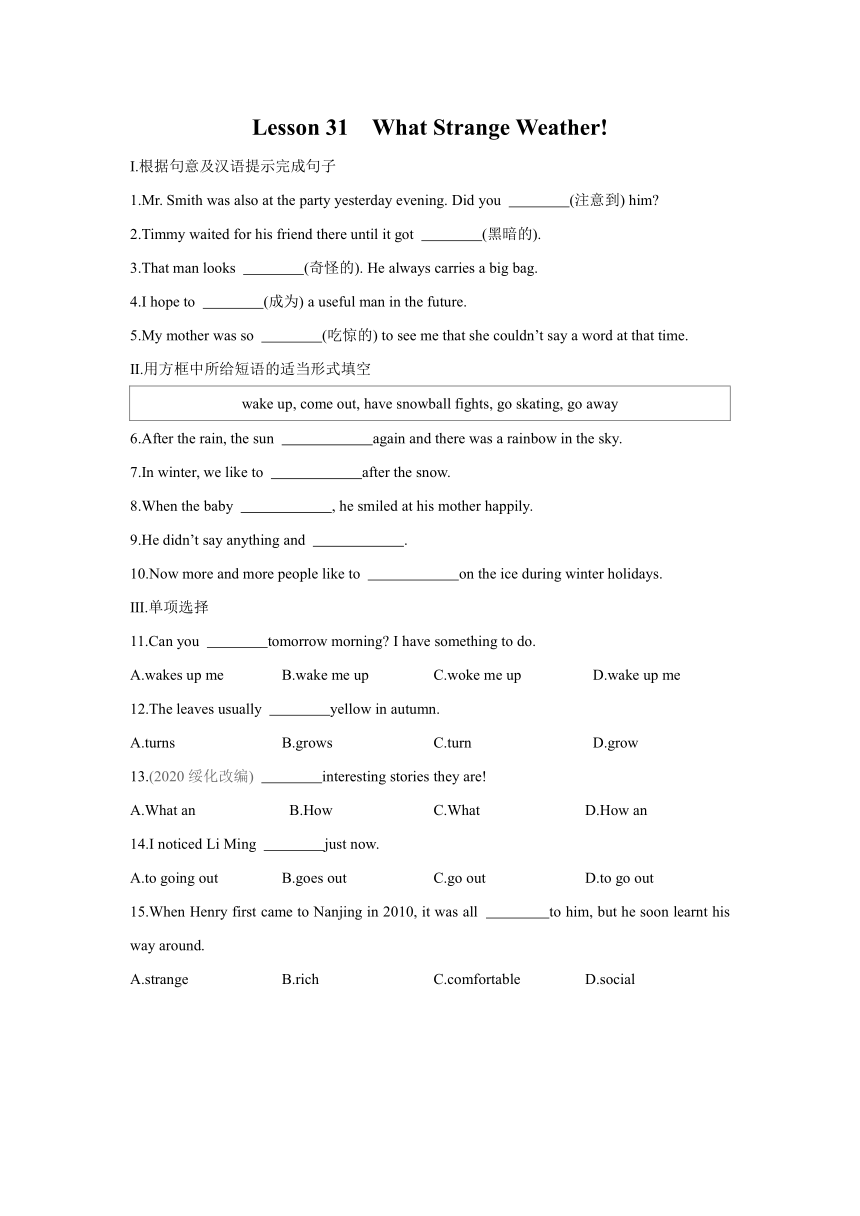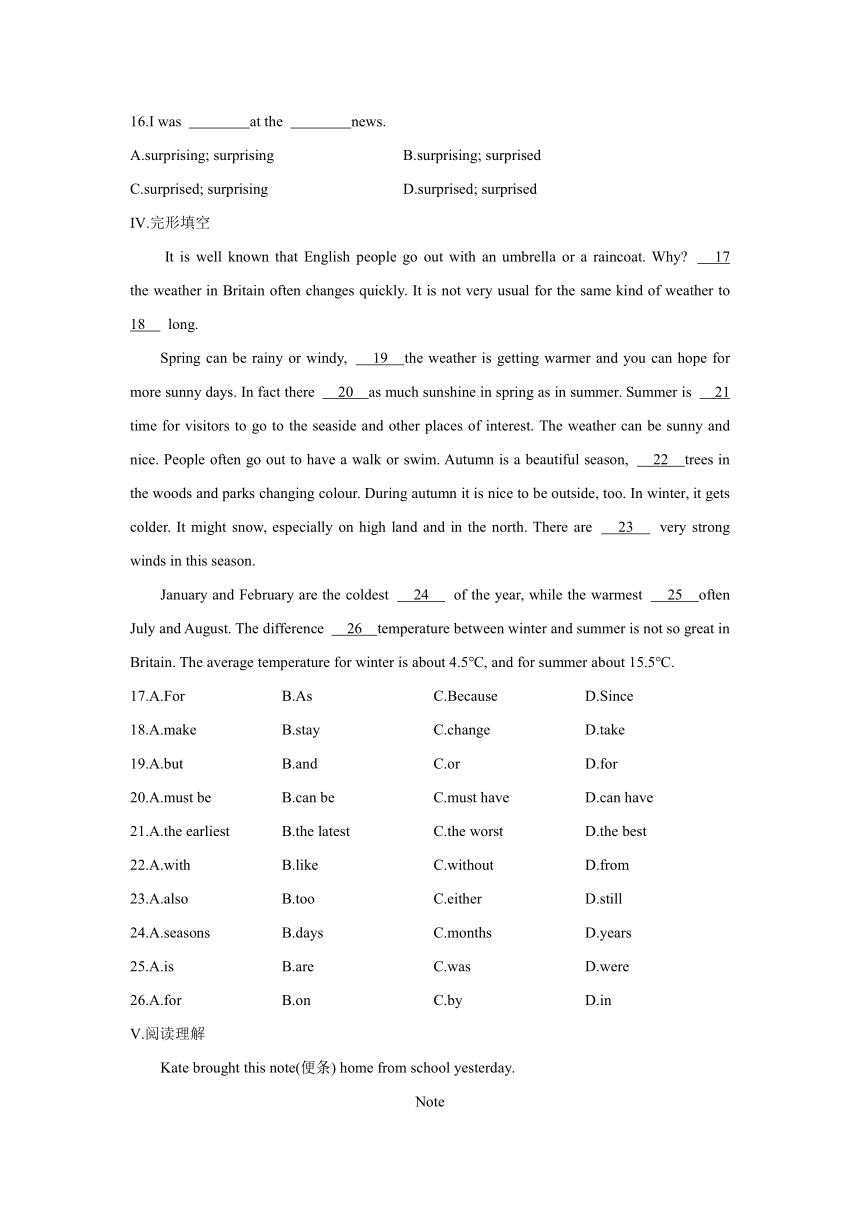Unit6 Lesson 31 What Strange Weather!课时练习(含答案)
文档属性
| 名称 | Unit6 Lesson 31 What Strange Weather!课时练习(含答案) |  | |
| 格式 | docx | ||
| 文件大小 | 43.5KB | ||
| 资源类型 | 教案 | ||
| 版本资源 | 冀教版 | ||
| 科目 | 英语 | ||
| 更新时间 | 2022-04-13 09:05:51 | ||
图片预览


文档简介
Lesson 31 What Strange Weather!
Ⅰ.根据句意及汉语提示完成句子
1.Mr. Smith was also at the party yesterday evening. Did you (注意到) him
2.Timmy waited for his friend there until it got (黑暗的).
3.That man looks (奇怪的). He always carries a big bag.
4.I hope to (成为) a useful man in the future.
5.My mother was so (吃惊的) to see me that she couldn’t say a word at that time.
Ⅱ.用方框中所给短语的适当形式填空
wake up, come out, have snowball fights, go skating, go away
6.After the rain, the sun again and there was a rainbow in the sky.
7.In winter, we like to after the snow.
8.When the baby , he smiled at his mother happily.
9.He didn’t say anything and .
10.Now more and more people like to on the ice during winter holidays.
Ⅲ.单项选择
11.Can you tomorrow morning I have something to do.
A.wakes up me B.wake me up C.woke me up D.wake up me
12.The leaves usually yellow in autumn.
A.turns B.grows C.turn D.grow
13.(2020绥化改编) interesting stories they are!
A.What an B.How C.What D.How an
14.I noticed Li Ming just now.
A.to going out B.goes out C.go out D.to go out
15.When Henry first came to Nanjing in 2010, it was all to him, but he soon learnt his way around.
A.strange B.rich C.comfortable D.social
16.I was at the news.
A.surprising; surprising B.surprising; surprised
C.surprised; surprising D.surprised; surprised
Ⅳ.完形填空
It is well known that English people go out with an umbrella or a raincoat. Why 17 the weather in Britain often changes quickly. It is not very usual for the same kind of weather to 18 long.
Spring can be rainy or windy, 19 the weather is getting warmer and you can hope for more sunny days. In fact there 20 as much sunshine in spring as in summer. Summer is 21 time for visitors to go to the seaside and other places of interest. The weather can be sunny and nice. People often go out to have a walk or swim. Autumn is a beautiful season, 22 trees in the woods and parks changing colour. During autumn it is nice to be outside, too. In winter, it gets colder. It might snow, especially on high land and in the north. There are 23 very strong winds in this season.
January and February are the coldest 24 of the year, while the warmest 25 often July and August. The difference 26 temperature between winter and summer is not so great in Britain. The average temperature for winter is about 4.5℃, and for summer about 15.5℃.
17.A.For B.As C.Because D.Since
18.A.make B.stay C.change D.take
19.A.but B.and C.or D.for
20.A.must be B.can be C.must have D.can have
21.A.the earliest B.the latest C.the worst D.the best
22.A.with B.like C.without D.from
23.A.also B.too C.either D.still
24.A.seasons B.days C.months D.years
25.A.is B.are C.was D.were
26.A.for B.on C.by D.in
Ⅴ.阅读理解
Kate brought this note(便条) home from school yesterday.
Note
Dear fathers and mothers,
Spring is coming and the weather gets warmer. Our class will have a trip on Saturday, April 6. Students will play beach volleyball in the morning and have a picnic at half past twelve. Then they will go fishing or lie on the beach in the sunshine. They need these things for the trip:
·Paper plates
·Sandwiches or hamburgers
·Fruit
·Swimsuits(泳衣)
Please help your children with the package.
Thank you.
Mr. Lee
27.What will students do on Saturday morning, April 6
A.Lie on the beach. B.Have a picnic.
C.Go fishing. D.Play beach volleyball.
28.Which of the following don’t the students need to take
A.Paper plates. B.Fruit. C.Books. D.Food.
29.What does Mr. Lee do
A.He is a student. B.He is a teacher.
C.He is a cook(厨师). D.He is a driver.
答案
Lesson 31 What Strange Weather!
Ⅰ.1.notice 2.dark 3.strange
4.become 5.surprised
Ⅱ.6.came out 7.have snowball fights
8.woke up 9.went away
10.go skating
Ⅲ.11.B
12.C 指颜色的变化,用turn;主语the leaves为复数可数名词,谓语动词用原形。故选C。
13.C 考查感叹句。句意:它们是多么有趣的故事啊!由interesting stories可知,用what引导感叹句,其结构为“What+ adj.+可数名词复数+主语+谓语!”故选C。
14.C notice sb do sth意为“注意到某人做某事”。
15.A 16.C
Ⅳ.17—21 CBABD 22—26 AACBD
Ⅴ.27—29 DCB
Ⅰ.根据句意及汉语提示完成句子
1.Mr. Smith was also at the party yesterday evening. Did you (注意到) him
2.Timmy waited for his friend there until it got (黑暗的).
3.That man looks (奇怪的). He always carries a big bag.
4.I hope to (成为) a useful man in the future.
5.My mother was so (吃惊的) to see me that she couldn’t say a word at that time.
Ⅱ.用方框中所给短语的适当形式填空
wake up, come out, have snowball fights, go skating, go away
6.After the rain, the sun again and there was a rainbow in the sky.
7.In winter, we like to after the snow.
8.When the baby , he smiled at his mother happily.
9.He didn’t say anything and .
10.Now more and more people like to on the ice during winter holidays.
Ⅲ.单项选择
11.Can you tomorrow morning I have something to do.
A.wakes up me B.wake me up C.woke me up D.wake up me
12.The leaves usually yellow in autumn.
A.turns B.grows C.turn D.grow
13.(2020绥化改编) interesting stories they are!
A.What an B.How C.What D.How an
14.I noticed Li Ming just now.
A.to going out B.goes out C.go out D.to go out
15.When Henry first came to Nanjing in 2010, it was all to him, but he soon learnt his way around.
A.strange B.rich C.comfortable D.social
16.I was at the news.
A.surprising; surprising B.surprising; surprised
C.surprised; surprising D.surprised; surprised
Ⅳ.完形填空
It is well known that English people go out with an umbrella or a raincoat. Why 17 the weather in Britain often changes quickly. It is not very usual for the same kind of weather to 18 long.
Spring can be rainy or windy, 19 the weather is getting warmer and you can hope for more sunny days. In fact there 20 as much sunshine in spring as in summer. Summer is 21 time for visitors to go to the seaside and other places of interest. The weather can be sunny and nice. People often go out to have a walk or swim. Autumn is a beautiful season, 22 trees in the woods and parks changing colour. During autumn it is nice to be outside, too. In winter, it gets colder. It might snow, especially on high land and in the north. There are 23 very strong winds in this season.
January and February are the coldest 24 of the year, while the warmest 25 often July and August. The difference 26 temperature between winter and summer is not so great in Britain. The average temperature for winter is about 4.5℃, and for summer about 15.5℃.
17.A.For B.As C.Because D.Since
18.A.make B.stay C.change D.take
19.A.but B.and C.or D.for
20.A.must be B.can be C.must have D.can have
21.A.the earliest B.the latest C.the worst D.the best
22.A.with B.like C.without D.from
23.A.also B.too C.either D.still
24.A.seasons B.days C.months D.years
25.A.is B.are C.was D.were
26.A.for B.on C.by D.in
Ⅴ.阅读理解
Kate brought this note(便条) home from school yesterday.
Note
Dear fathers and mothers,
Spring is coming and the weather gets warmer. Our class will have a trip on Saturday, April 6. Students will play beach volleyball in the morning and have a picnic at half past twelve. Then they will go fishing or lie on the beach in the sunshine. They need these things for the trip:
·Paper plates
·Sandwiches or hamburgers
·Fruit
·Swimsuits(泳衣)
Please help your children with the package.
Thank you.
Mr. Lee
27.What will students do on Saturday morning, April 6
A.Lie on the beach. B.Have a picnic.
C.Go fishing. D.Play beach volleyball.
28.Which of the following don’t the students need to take
A.Paper plates. B.Fruit. C.Books. D.Food.
29.What does Mr. Lee do
A.He is a student. B.He is a teacher.
C.He is a cook(厨师). D.He is a driver.
答案
Lesson 31 What Strange Weather!
Ⅰ.1.notice 2.dark 3.strange
4.become 5.surprised
Ⅱ.6.came out 7.have snowball fights
8.woke up 9.went away
10.go skating
Ⅲ.11.B
12.C 指颜色的变化,用turn;主语the leaves为复数可数名词,谓语动词用原形。故选C。
13.C 考查感叹句。句意:它们是多么有趣的故事啊!由interesting stories可知,用what引导感叹句,其结构为“What+ adj.+可数名词复数+主语+谓语!”故选C。
14.C notice sb do sth意为“注意到某人做某事”。
15.A 16.C
Ⅳ.17—21 CBABD 22—26 AACBD
Ⅴ.27—29 DCB
同课章节目录
- Unit 1 A Trip to the Silk Road
- Lesson 1 A Trip to China
- Lesson 2 Meet You in Beijing
- Lesson 3 A Visit to Xi'an
- Lesson 4 A Visit to Lanzhou
- Lesson 5 Another Stop along the Silk Road
- Lesson 6 Jenny's Diary
- Unit 2 It's Show Time!
- Lesson 7 What's Your Project about?
- Lesson 8 Marco Polo and the Silk Road
- Lesson 9 Danny's School Project
- Lesson 10 Music and Dance
- Lesson 11 Food in China
- Lesson 12 A Blog about the Silk Road
- Unit 3 School Life
- Lesson 13 How Is School Going?
- Lesson 14 Jenny's School Life
- Lesson 15 Making a Difference
- Lesson 16 We Are with You!
- Lesson 17 School Science Fai
- Lesson 18 Teaching in China
- Unit 4 After-School Activities
- Lesson 19 A Dinner Date
- Lesson 20 Join Our Club!
- Lesson 21 What Is Your Club Type?
- Lesson 22 Big Plans for the Weekend
- Lesson 23 A Weekend with Grandma
- Lesson 24 How was Your Weekend?
- Unit 5 I Love Learning English!
- Lesson 25 A Phone Friend
- Lesson 26 Online Phone Calls
- Lesson 27 Amazing English
- Lesson 28 How Do I Learn English?
- Lesson 29 A Door to the World
- Lesson 30 Writing an E-mail in English
- Unit 6 Seasons
- Lesson 31 What Strange Weather!
- Lesson 32 I Can't Wait for Winter!
- Lesson 33 Kim's Favourite Season
- Lesson 34 Steven's Report
- Lesson 35 Surfing in Sydney
- Lesson 36 Spring in China
- Unit 7 Sports and Good Health
- Lesson 37 You Are What You Eat!
- Lesson 38 Stay Healthy!
- Lesson 39 Danny's Report
- Lesson 40 Move Your Body
- Lesson 41 Were People Healthy Then?
- Lesson 42 Know Yourself
- Unit 8 Summer Holiday Is Coming!
- Lesson 43 Have a Good Summer!
- Lesson 44 Volunteering in Summe
- Lesson 45 Baseball Season
- Lesson 46 Get Ready for Summer Holiday!
- Lesson 47 Summer Plans
- Lesson 48 Li Ming's Summer Holiday
